Complete Guide To Wine Yeast
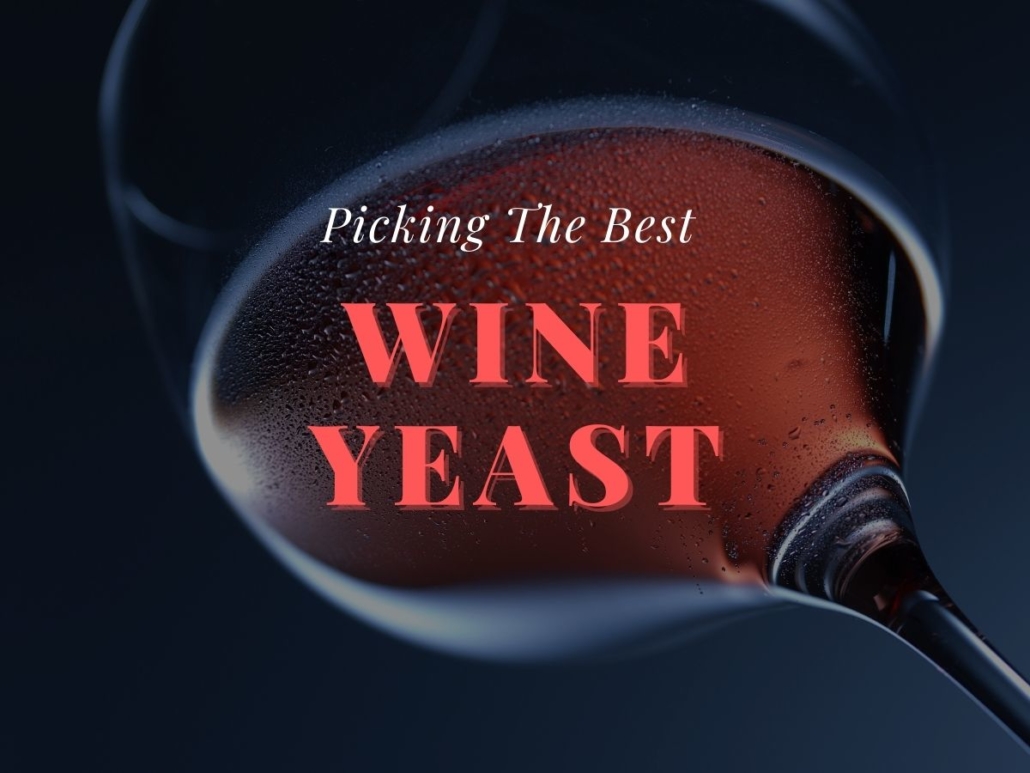
The amount of wine yeast strains available to homebrewers is vast and getting bigger all the time.
Choosing a wine yeast for your next wine now means looking through the offerings of 3 or 4 different yeast producers then reading the specifications and descriptions.
To help you understand different yeast strains and varieties we have compiled a list of wine yeasts from all the large yeast labs and summarised their best uses and characteristics.
Table of Contents
The Role Of Yeast In Wine
Choosing the right yeast for the type of wine being produced has a big effect.
Not only is there the type of wine being made whether it is red, white or rose but also the fermentation environment, tannins, acidity and flavour of the must that will interplay with the yeast.
Factors such as the following will need considering when selecting a yeast.
Alcohol tolerance
This is the level to which a yeast strain can ferment sugars into alcohol before reaching a limit. Certain strains have higher tolerances than others so it is important when selecting a wine yeast strain to ensure the level of alcohol in the finished wine doesn’t surpass the tolerance of the yeast.
Factors such as nutrients, temperature, rehydration, yeast health and viability will also affect the tolerance of the yeast to the level of alcohol so there can be some variation in a particular yeast strains tolerance.
Fermentation temperature range
The fermentation range of a yeast strain determines the temperature at which the yeast will ferment the wine without stalling or becoming stressed. If the wine fermentation is too cold the yeast will be sluggish or not ferment the sugars at all. Too higher temperatures and the yeast will become stressed and produce undesirable flavours in the wine.
Within the temperature range of a given yeast strain, there can be some variables that will change. For example, fruity flavours may be more pronounced at the higher end of the temperature range of a particular strain. This can be considered when selecting a wine yeast and the temperature the wine fermentation is carried out at.
Attenuation
The attenuation of yeast determines the percentage of sugars a yeast strain is able to ferment. 80% attenuation would indicate 80% of the available sugars will be fermented by the yeast. This will indicate how much residual sugar is left in the wine when the yeast have completed a fermentation. Different yeast strains will have variable levels of attenuation. If you are making a sweeter wine then you will want to select a wine yeast that has a lower attenuation so there is some residual sweetness in the finished wine.
The Best Wine Yeast Strains
Lalvin EC-1118 Champagne Yeast: From Lallemand is probably the most used and forgiving all-rounder yeast is EC-1118. This particular yeast is most often recommended for fruit wines because it is a workhorse and will cope with a wide range of conditions and lack of nutrients.
- Alcohol tolerance:
- Temperature range:
Lalvin RC212 Burgundy Yeast: Lalvin RC212 is a yeast strain isolated in the Burgundy region ideally suited for red wines with structure, colour and tannins. RC212 yeast cells only absorb a limited amount of poly[henols the colour of the finished wine is darker and has a higher tannin level. Ferments moderately quickly and a good choice for wines with riper berry and spicy character.
- Alcohol tolerance: 16% ABV
- Temperature range: 20°C – 30°C (68°F – 86°F)
Lalvin 71B: 71B is a yeast strain that is good for rounding out high acid wines. Softening the profile of the wine by metabolizing malic acid by up to 30%. Lalvin 71B will enhance aromatic qualities of fruit and floral wine and is ideal for making white or semi-sweet blush wines that have residual sugar content.
- Alcohol tolerance: up to 14% ABV
- Temperature range: 15°C to 30°C
Lalvin D47: D47 is a wine yeast isolated from the Cote Du Rhone region. This particular strain prefers slightly cooler fermentation temperatures starting around 17 – 20°C and is highly suited for the production of white wines such as Chardonnay. Lalvin D47 will accentuate fruits, tropical and citrus notes and will produce a rounder wine with a soft palate.
- Alcohol tolerance: 15% ABV
- Temperature range: 15-30°C (59-86°F)
Lalvin K1V-1116 Montpellier Yeast: K1V-V1116 is a wine yeast suited to floral wines and does well in styles such as Chenin Blanc or Sauvignon Blanc. When fermented at temperatures below 16°C K1V-1116 will produce floral esters as long as nutrient requirements are in the must. This particular yeast strain is highly suited to difficult fermentations such as fruit wine musts that are cooler, lacking nutrients and fatty acids.
- Alcohol tolerance: 18% ABV
- Fermentation temperature: 10°C – 35°C (50°F – 95°F)
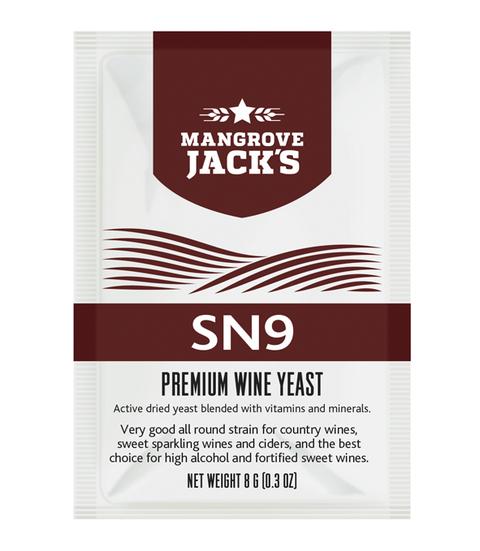
Mangrove Jack SN9: SN9 by Mangrove jack is an ideal choice for floral wines or country wines with a lower proportion of fruit as it will retain a structure in the wine. It is also tolerant of a wide range of temperatures and must conditions where nutrients may be lacking. Of all the mangrove jack yeast strains SN9 is the fastest to clear and flocculate.
- Alcohol tolerance: up to 18% ABV
- Temperature range: 14 – 28°C (57 – 82°F)
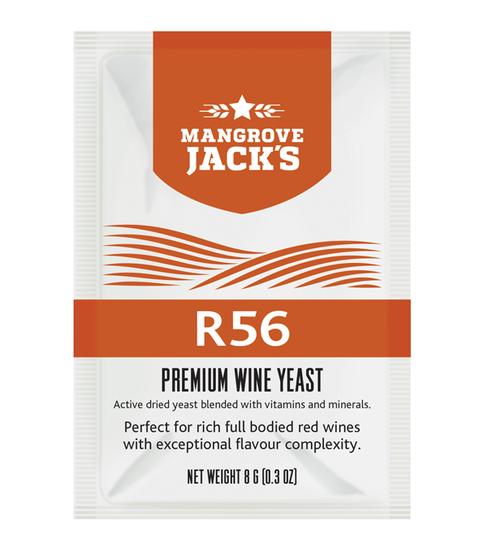
Mangrove Jack R56: R56 is a wine yeast strain ideally suited for fermenting full-flavored red wines. Enhancing body, mouthfeel and complexity Mangrove Jack R56 suits old world styles and works in wine styles such as Malbec, Merlot and Nebbiolo. Suits dark fruit wines such as blackberry, plum and damson wines and ages well.
- Alcohol tolerance: 15% ABV
- Temperature range: 18 – 28°C (64 – 82°F)
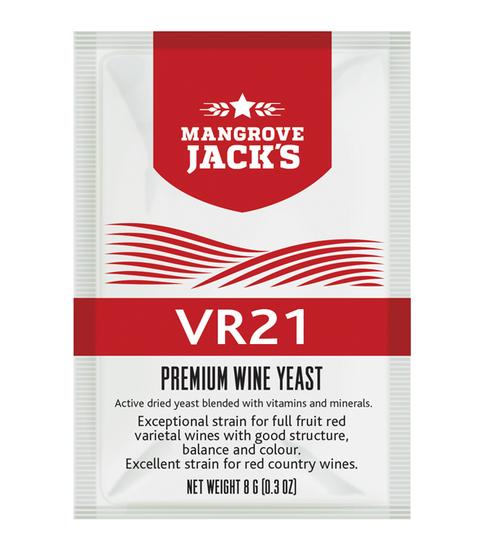
Mangrove Jack VR21
VR21 is a good strain for all styles of red wine and will produce balanced wines. Mainly suited for medium ABV wines with a neutral palate but still preserving the fruit flavour and aroma qualities. Good for Syrah, Tempranillo, Sangiovese, Shiraz.
- Alcohol tolerance: up to 15% ABV
- Temperature range: 18°C – 28°C (64°F – 82°F)
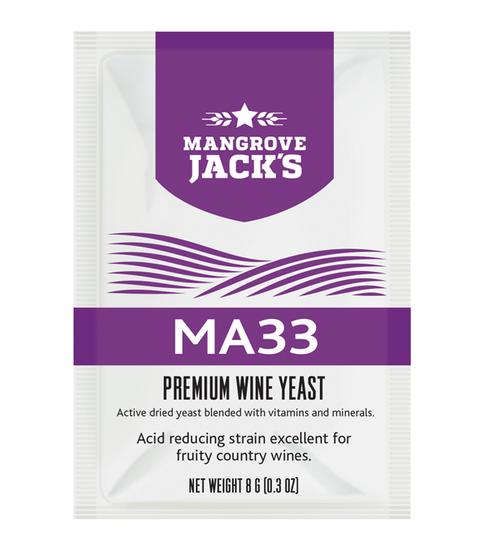
Mangrove Jack MA33: Similar to Lalvin 71B this yeast strain by Mangrove Jack is good for reducing acid in white and rose wines. Fermentation will leave some residual sugars in the finished wines so MA33 is ideally suited to sweeter wines that have fresh and fruity flavour profiles. Good for wines that are intended to be served young with fast turnarounds.
- Alcohol tolerance: 14% ABV
- Temperature range: 18 – 28°C (64 – 82°F)
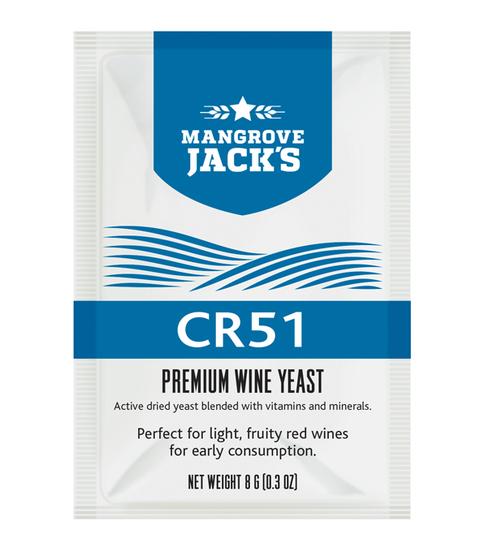
Mangrove Jack CR51: CR51 is a wine yeast suitable for light, refreshing and fruity red wines. It produces smooth and light red wines and is particularly useful for making wines that are consumed quickly or are relatively young. CR51 is a moderately fast fermenter and will produce wines in the style of Pinot Noir or Gamay.
- Alcohol tolerance: 13% ABV
- Temperature range: 16°C – 24°C (61°F – 75°F)
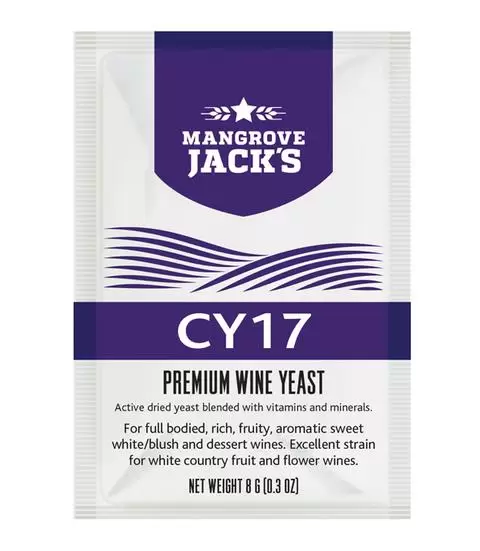
Mangrove Jack CY17: This white wine strain promotes body and structure in medium to sweet wines. Enhances fruity and bold character from fruit and floral ingredients and is also good for rose or blush wines. Think Sauvignon blanc, Zinfandel and sweet dessert wines.
- Alcohol tolerance: 14% ABV
- Temperature range: 16°C – 24°C (61°F – 75°F)
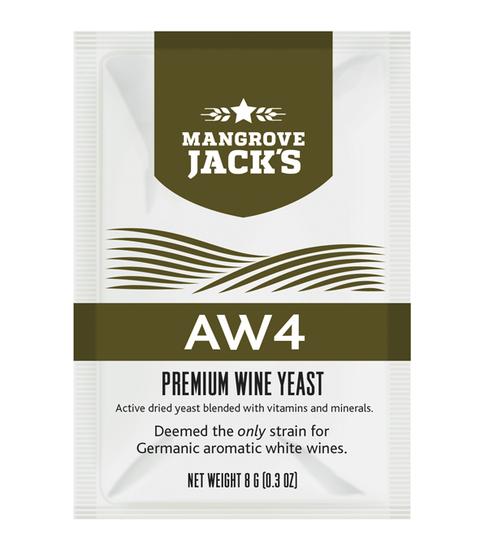
Mangrove Jack AW4: AW4 is a wine yeast that is ideal for making German style white or rose wines. It is a yeast that enhances aromatic qualities of grapes or fruits and gives a nice spiciness in the finished wine. Use in wine styles like Gewurztraminer or Riesling for a winning combination
- Alcohol tolerance: 14% ABV
- Temperature range: 16°C – 24°C (61°F – 75°F)
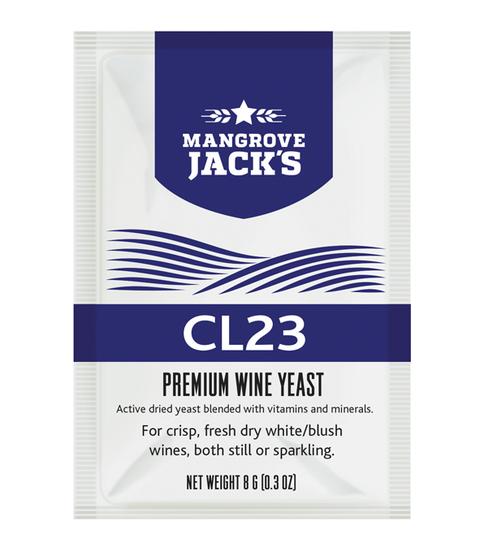
Mangrove Jack CL23: CL23 is a wine yeast with a very high alcohol tolerance at 18% ABV. It displays a neutral sensory aroma in finished wines and is ideal for making sparkling wines as well as crisp white or rose wines. CL23 is quite tolerant of less than ideal conditions so is good for vegetable or fruit wines with lower nutrient musts.
- Alcohol tolerance: 18% ABV
- Temperature range: 14°C – 32°C (57°F – 90°F)
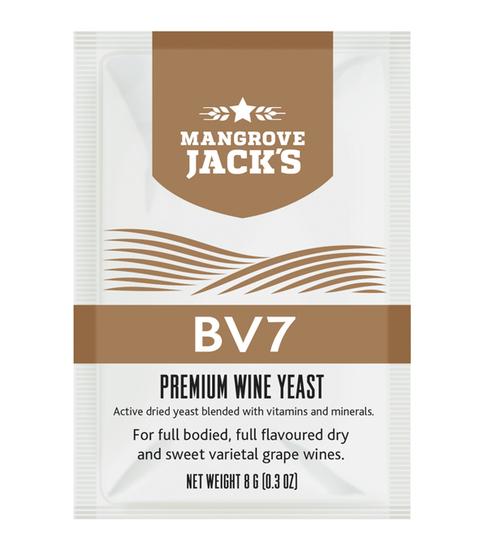
Mangrove Jack BV7: BV7 is a wine yeast that produces rich, full bodied white wines. The yeast will enhance fruit aromas and boost mouthfeel and structure in the wine. BV7 has a lower alcohol tolerance and is capable of producing dry or sweet white wines.
- Alcohol tolerance: 13% ABV
- Temperature range: 14°C – 28°C (57°F – 82°F)
Red Star Cote Des Blanc: Côte Des Blanc from Red Star, also known as Geisenheim Espernay is a wine yeast suitable for white and light red wines. It is a slower speed fermenter and needs temperature monitoring, at lower temperatures it will leave residual sugars in the wine so makes a good choice to fuller and sweeter wine varieties.
- Alcohol tolerance: 13 – 14% ABV
- Temperature range: 12°C – 24°C (53°F – 75°F).
Red Star Montrachet: Red Star Montrachet, also known as Premier Classique is a good all-purpose yeast that is suited to full-bodied red and white wines. A swift and strong fermenter as well as preserving tannins and colour. Montrachet is recommended for many fruit wines because of it’s all-purpose reputation.
- Alcohol tolerance: 13% ABV
- Temperature range: 12°C – 35 °C (54°F – 95 °F)
Red Star Pasteur Blanc (ex Pasteur Champagne): Pasteur blanc or Premier Blanc was formerly known as Pasteur Champagne but confusingly is not recommended for sparkling wine. Pasteur Blanc has a high alcohol tolerance at 15% ABV and a neutral flavour profile. Recommended for most dry white wine styles and fruit musts and will ferment fully leaving very little residual sugar.
- Alcohol tolerance: 13 – 15% ABV
- Temperature range: 15°C – 30°C (59°F – 86°F)
Red Star Pasteur Rouge: Red Star Pasteur Rouge or Premier Rouge is a strong fermenter, ideally suited to fermenting full-bodied reds. Encourages the development of fruit flavours and aromas in the Cabernet family. Pasteur Rouge is an ideal strain for Cabernet Sauvignon, Merlot, Zinfandel and will enhance the character of less robust fruit in red wines.
Used in country wines it is good for dark fruits such as plums, elderberries and blackberries.
- Alcohol tolerance: up to 15% ABV
- Temperature range: 17°C and 30°C (64°F to 86°F)
Red Star Premier Cuvee: Premier Cuvee also known as Prise de Mousse is one of the fastest fermenters from red star. Producing exceptional clean and neutral fermentation with a very high alcohol tolerance at 18% ABV. SUitable for fermenting white, red or sparkling wines and tolerant of less than ideal conditions.
- Alcohol tolerance: 18% ABV
- Temperature range: 8°C – 35°C (45°F – 95°F)

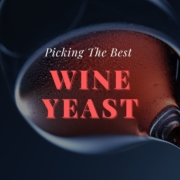


Hello can’t I use bread yeast
Bakers yeast will ferment sugars in wine but the taste will not be great and the amount of sugar in a wine may not be fully consumed by the yeast resulting in a less than satisfactory wine. Hope this helps.